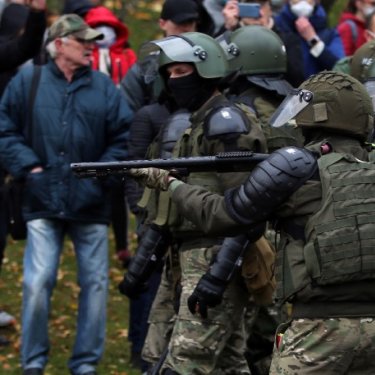Figures for three-month crackdown on press freedom in Belarus

Reporters Without Borders (RSF) is publishing figures for the unprecedented crackdown on press freedom and journalists in Belarus during the three months since the presidential election on 9 August. Hundreds of journalists have been harassed, arrested and even tortured to prevent coverage of the continuing protests.
658
Tallied by RSF, this is the combined total of days that journalists have spent in prison during the past three months. It reflects the scale of the crackdown since the start of peaceful demonstrations to demand President Alexander Lukashenko’s departure after the fraudulent election on 9 August.
335
This is the number of arrests of journalists that the Belarusian Association of Journalists (BAJ), an RSF partner, has logged in the past three months. They are part of the more than 400 press freedom violations committed by the police.
16
Sixteen is the number of journalists currently in prison. No fewer than eight journalists were arrested yesterday alone, which saw a record number of arrests of demonstrators. Those arrested yesterday included Ian Avseyushkin, who is the correspondent of the Swiss newspaper Wochenzeitung and a reporter for the BelaPAN news agency. He is still being held in Minsk.
3 days to 3 years
Until now, most of the journalists who have been tried have been given prison sentences ranging from 3 to 15 days. But the sentences are getting longer. Three reporters for the Belarusian exile TV channel Belsat – Zmitser Soltan (Buyanau), Zmitser Krauchuk and Artsiom Bahaslauski – are facing possible three-year sentences. Arrested while covering a demonstration on 1 November, they have been charged with “organizing and preparing activities that constitute a flagrant violation of public order.”
60
At least 60 journalists have been the victims of serious violence, mistreatment and even torture by the police in the past three months. They include Belsat journalist Alena Dubovik (Scharbinskaya), who was beaten with a baton while half naked during detention in August. She was also denied food for 24 hours and was placed with 50 other women detainees in a 12-square-metre cell meant for four people.
At least three journalists injured by shots
Of the dozens of journalists who have been injured by police during the demonstrations, at least two have been injured by rubber bullets and one by a projectile of an unknown nature. Natalia Lubneuskaya, a journalist with the Nasha Niva news website, was hospitalized for 38 days after being shot by a policeman 10 metres away from her. Emilie van Outeren, a Dutch reporter on assignment for the NRC newspaper, and Iryna Arahouskaya, a photojournalist with Belsat, were also injured by shots.
29 October 2020
Since this date, Belarus has closed its land borders with the European Union to foreign citizens including journalists. The reason given by the National Border-Guard Committee was to stop the spread of Covid-19. But the border with Russian remains open.
More than 70 accreditations rescinded
All journalists working for foreign media were stripped of their accreditation on 2 October with the declared aim of introducing a new “more liberal” procedure. On 7 October, the foreign ministry announced that it had already received more than 70 applications from 15 foreign media outlets. Although the deadline for considering applications has expired, many Belarusian journalists are still waiting for their re-accreditation in order to work legally. The foreign ministry had previously rescinded the accreditations of at least 17 journalists, including RSF’s correspondent, on 29 August.
1 referral (to 3 special rapporteurs)
RSF has formally asked three United Nations special rapporteurs to condemn this draconian and unprecedented crackdown on journalists and media censorship.
1 report (with 700 contributions)
The crackdown is documented in a 58-page report published by the Organization for Security and Cooperation in Europe on 5 November. After analyzing 700 contributions, including RSF’s, independent rapporteur Wolfgang Benedek concluded, inter alia, that there have been widespread violations of the rights of journalists and media and access to information.
1 resolution
In view of the scale of the crackdown, the German parliament adopted a resolution on 4 November calling on the federal government to assist journalists affected by the repression in Belarus and to provide financial support to independent Belarusian media outlets both in Belarus and in exile.
Journalists are continuing to do their job to cover events although the crackdown has continued for three months and despite the fact that the state media are stepping up their propaganda and the authorities are taking an even tougher line. One of these journalists, Andrei Vaitovich, who has French as well as Belarusian nationality, has talked about his experiences in a video for RSF.
Ruled since 1994 by Lukashenko, who has been reelected in the first round every five years, Belarus is ranked 153rd out of 180 countries in RSF’s 2020 World Press Freedom Index.



